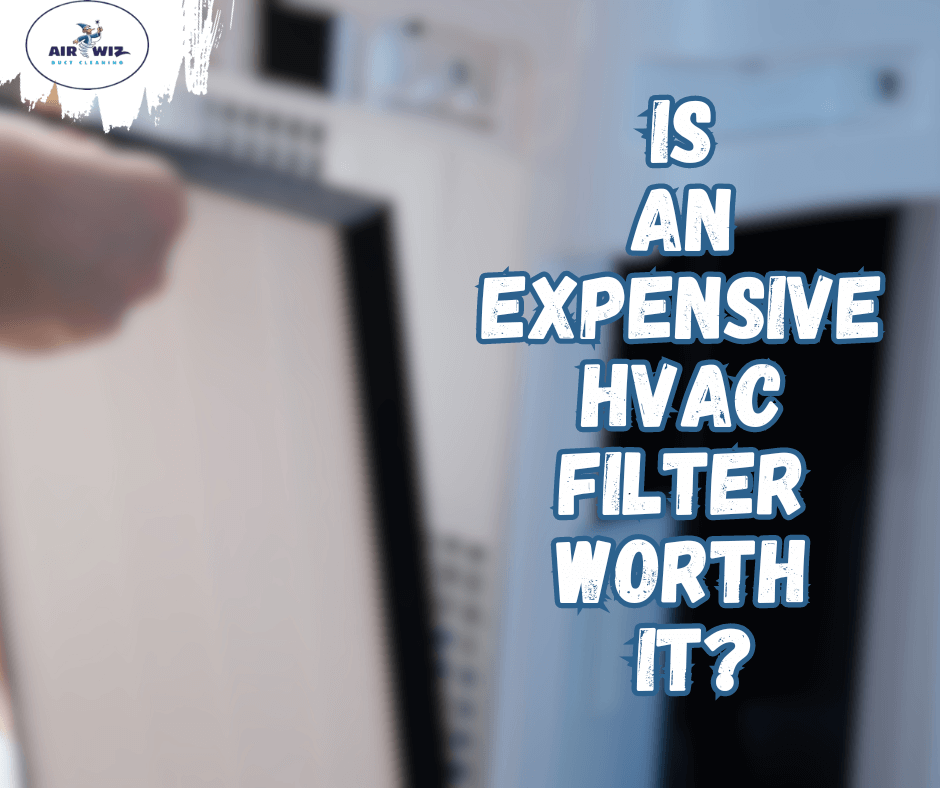Is an expensive HVAC filter worth it?

Air filters are crucial for maintaining indoor air quality and a clean home. But as you’re shopping for an air filter, you’ve noticed a variation in pricing, so you’re wondering, ‘Is an expensive HVAC filter worth it?’

Generally, the more costly an air filter is, the more effective it is. However, an individual with no family, pets, or allergies might not need that level of filtration like a household of five, two pets, and a child with allergies. Also, expensive HVAC filters tend to be of higher quality, hence lasting longer.
AirWiz Duct Cleaning professionals have handled a range of air filters and have a good idea of their different performances beyond their marketing. In addition to air duct cleaning and completing light repairs and replacements, we can guide you on the best HVAC filter for your needs.
Why change your HVAC filters?
The air filter traps pollutants like pollen, dust, mold, dust mites, dirt particles, bacteria, and pet dander. With time, these airborne particles clog the filter, compromising its ability to clean the air. Consequently, this exacerbates allergies and respiratory conditions like hay fever and asthma. A clogged air filter also reduces energy efficiency since it has to work harder to control temperature.
Routinely changing your air filter is part of good maintenance, which helps the system last longer. A clean and new air filter reduces pressure and overall wear and tear on the system.
Note: You should replace your air filter regularly according to manufacturer recommendations.
Difference between a cheap and expensive HVAC filter
Expensive filters are crafted from higher-quality materials; hence, they offer longevity and are better at trapping pollutants. This results in enhanced indoor air quality and a healthier living environment.
Cheap filters are often crafted from materials like pleated paper and cardboard, so they have a shorter lifespan. Their susceptibility to damage from moisture and heat means frequent replacements, potentially costing more over time.
In contrast, premium filters are usually made from durable materials like fiberglass, which boasts a porous structure that traps a broader range of particulate matter and is resilient against moisture and heat damage. Overall, premium filters can serve effectively for up to a year, offering both cost savings and convenience.
What is a MERV rating?
MERV, which stands for Minimum Efficiency Reporting Value, is a scale introduced in 1987 that measures how well a filter traps particles in the air, preventing them from being circulated into a space.
The MERV rating provides a detailed insight into how well a filter can capture and remove particles from the air, helping you make informed choices about their air filtration needs. It might be tempting to get a filter that traps the most airborne dust particles (the highest MERV rating), but this could damage your air conditioner system.
A higher MERV rating translates into more resistance and less airflow, which might force your system to work harder to achieve the required air velocity to reach every corner of your home for consistent temperature regulation.
The MERV rating ranges from 1-20, with different rating groupings trapping different particle sizes.
| MERV | Minimum Particle Size |
|---|---|
| 1–4 | > 10.0 μm |
| 5–8 | 10.0–3.0 μm |
| 9–12 | 3.0–1.0 μm |
| 13–16 | 1.0–0.3 μm |
| 17–20 | < 0.3 μm |
How do you know your MERV needs?
For individuals who don’t have pets and severe allergies, a MERV rating between 5 and 8 should be sufficient. However, if you have pets or deal with respiratory issues, it’s advisable to opt for a filter with a higher MERV rating, ranging from 9 to 12, to ensure cleaner air and better health.
If your home has a fireplace or a lot of smoke, you should get a filter with a MERV rating between 13 and 16. These filters are good for trapping fumes and smoke particles. Filters with 17-20 MERV ratings are ideal for manufacturing buildings and hospitals.
You should also check your AC’s manual for the recommended MERV ratings. Exceeding the recommended rating often causes problems.
When should you not buy an expensive air filter?
Expensive air filters may be more effective but not ideal for your home. Your choice should be guided by several factors, including the presence of pets or if anyone in your home suffers from allergies. Depending on your response, a cheap air filter might suffice.
Washable filters can be tempting because they’ll serve you for several years instead of a couple of months. While this is great in theory, washable air filters have several problems, including lower MERV ratings, frequent maintenance, and attracts mold to your air filtration unit.
Consult with AirWiz Duct Cleaning
Understanding the intricacies of air conditioning filters, from their materials to their MERV ratings, is essential for maintaining optimal air quality in your home. Making informed decisions about your filters can lead to a healthier living environment and a more efficient HVAC system.
If you’re uncertain about your MERV needs, AirWiz Duct Cleaning is here to assist. With our expertise and dedication to ensuring clean air for homes, you’re in capable hands. Contact us today and breathe easier knowing you’ve chosen the best in the industry. Call (301) 871-2250.
